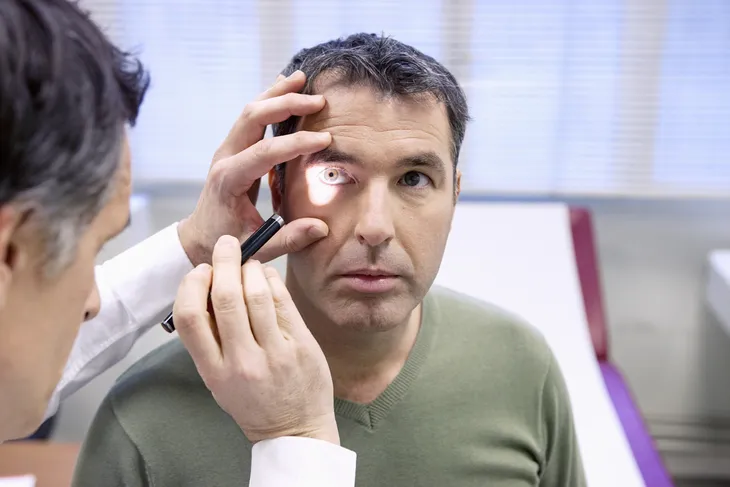The United States Centers for Disease Control and Prevention (CDC) considers cardiovascular disease the “leading killer of Americans.” That’s a pretty serious and scary description, especially considering that there’s often little indication of a health issue leading up to a heart attack (referred to clinically as a myocardial infarction [MI]).
On top of the most common risk factors for heart disease (i.e., high blood pressure [hypertension], high blood cholesterol [hyperlipidemia], diabetes, obesity, age (60+ years), and family history of heart attack, we look into several other lesser known factors that can forecast heart issues in your future…
Dizziness Upon Standing
You may not be familiar with the term orthostatic hypotension. However, it represents overwhelming light-headedness, which can span a few minutes, strikes certain individuals when they stand up a little too quickly from a seated or lying position.
According to data from the University of North Carolina, this type of blood flow issue can predict cardiovascular failure in the future. In fact, research concludes that orthostatic hypotension can increase the risk of heart failure later life by up to 54-percent.
Achy Arms
Consider this warning from the American Heart Association (AHA) — heart attack symptoms can span from minor and ambiguous to even, nonexistent. That’s why if you experience oddly minor aches or pains in the arms, you may suffer a heart attack down the road.
Research from the AHA points out that achy or fatigued arm muscles that mimic the sensation you feel after lifting heavy objects can strike in the months prior to a heart attack. This ache can be due to a blockage of an artery in the heart.
How Long is Your Ring Finger?
You likely would never associate the length of your ring finger with heart disease risk. However, scientists from the University of Liverpool consider a short ring finger a sign of future heart trouble.
The UK research explains that individuals with longer ring fingers (longer than the index finger) typically have a decreased risk of heart problems due to higher testosterone exposure in the womb. However, if your ring finger is the same length or shorter than your index finger, the risk of heart disease is considered higher once you surpass 40+ years of age.
Earlobe Creases
Although it sounds a little bizarre, researchers from the Department of Medicine at the University of Pennsylvania Hospital can judge your future risk of heart disease just by taking a peek at your ear lobes. Strange as it sounds, the researchers note a telltale crease in one or both ear lobes may predict future heart troubles.
The distinctive wrinkle in the ear lobe(s), known as Frank’s sign (after Sanders T. Frank, the man who identified the link back in 1973), is considered a telltale sign of an arterial blockage and prospective cardiovascular issues.
Exercise Yawns
Why do we yawn? Science tells us that we yawn to oxygenate the blood while cooling the brain. It makes sense then that a yawn or two may escape during strenuous exercise on a sunny day.
Not so fast, according to a study from State University of New York at Albany, which shows an odd yawn here and there is perfectly fine, but chronic yawns during exercise can indicate a wonky ticker. For instance, circulatory blockages can cause the body’s cooling system and heart to be inefficient, and those yawns may signal future issues with the heart.
Foul Breath
Bad breath is embarrassing. Often, not even a whole pack of gum can disguise that garlicky slice of pizza you gobbled down at lunch. However, your heart (along with your co-workers) may be suffering the consequences of your foul breath.
According to a study published in the American Journal of Preventive Medicine, bad breath is a sign of gum disease, and gum disease causes inflammation and, eventually, cardiovascular disease. So, if you avoid garlic and still suffer chronic bad breath, it may be time to book an appointment with your dentist, followed by your doctor.
Lack of Vitamin D
Vitamin D has many health benefits, and a deficiency could cause many serious illnesses and conditions. Research conducted at the University of Massachusetts Medical School found that stroke patients with significantly low vitamin D levels were more prevalent than those with normal levels. This is another reason to spend more time out in the sun during the summer months!
Air Pollution
We’ve known for a while that air pollution is not healthy. While it seems obvious that it would affect our breathing and lungs, it also lowers “good” cholesterol (or high-density lipoprotein cholesterol [HDL-C]).
A study published in Arteriosclerosis, Thrombosis, and Vascular Biology outlined that traffic-related pollution contains higher amounts of black carbon which has been shown to lower HDL-C levels over a prolonged period of time.
Improve your heart health in just five days! Sign up for our newsletter to receive our daily heart health checklist.
Having Four or More Pregnancies
As if the pain of childbirth isn’t enough, having multiple pregnancies can increase your risk of heart disease. Researchers at McMaster University in Hamilton, Ontario, and at Brigham and Women’s Hospital in Boston, Massachusetts, found a correlation in the data from the Women’s Health Study between the number of pregnancies a woman has and atrial fibrillation (an irregular heart rhythm that could lead to stroke). Women who had four or more pregnancies were 30- to 50-percent more likely to develop atrial fibrillation than those who had no pregnancies.
Your (Lack Of) Height
Being short has more disadvantages than not being about to reach anything on the top shelf. A study done by the British Heart Foundation suggests that the genes that make people short, may also control other risk factors, such as cholesterol levels. This is known as a non-modifiable risk factor, because as much as we wish we could be taller, we simply cannot change our height.
Fatty Bumps
Another strange indicator of potential future heart problems is fatty bumps (medically referred to as xanthomas). They can develop in various areas of the body, such as the buttocks, knees, elbows, or eyelids. Although the bumps themselves do not pose any health concerns, those who most commonly develop them have a genetic disease known as familial hypercholesterolemia, which causes high levels of “bad” cholesterol (or low-density lipoprotein cholesterol [LDL-C]).
In fact, these fatty bumps represent excess deposits of LDL-C. In addition to representing elevations of bad cholesterol, xanthomas are associated with an increased risk of heart disease.
Clubbed Fingernails
Have you noticed lately that your fingernails have become thicker and wider in shape? It may be an indication of heart disease. This condition is known as digital clubbing (less commonly, Hippocratic fingers) and tends to occur in both hands, although it does not usually cause any pain or other difficulties.
CNN explains that the reason clubbed fingers are indicative of heart problems is because “oxygenated blood is not reaching the fingers properly and so the cells produce a ‘factor’ that promotes growth to try and rectify the issue,” hence the change in shape. Be sure to keep an eye on your nail growth and report any visible changes to your physician.
Ring Around the Iris
The eyes can tell a great deal about a person’s health, including whether or not they are at risk of developing heart disease. In some people, a gray ring or halo may develop around the outside of their iris (the colored part of the eye).
This condition is referred to clinically as arcus senilis and occurs due to fatty deposits. But, because it doesn’t interfere with vision, it can easily be dismissed. It is also very common, affecting approximately 45-percent of people 40 and older and 70-percent of those older than 60.
Poor Oral Health
Your oral health, or lack thereof, can also serve as an important indicator of whether your heart is in trouble. Bad bacteria in the mouth not only cause your gums to become inflamed and your teeth to fall out but also can “enter the bloodstream from the mouth and cause inflammation in the blood vessels, which can lead to cardiovascular disease,” says CNN.
Prevention adds that suffering from a specific type of tooth infection, known as root tip infection or apical periodontitis, is also likely to increase your risk of heart disease if it’s left untreated. The reason? “Tooth infections like this are caused by an inflammatory disease that also causes low-grade inflammation in other parts of the body, such as the heart” which could lead to heart disease.
Not Having Acne as a Teenager
Acne is an embarrassing part of adolescence, but after hearing this, you may suddenly be thankful you experienced it. A study published in the American Journal of Epidemiology found that having acne as a teenager decreases a person’s risk of heart disease by a whopping 33-percent!
Although high levels of the hormone testosterone is what causes acne to occur during your teen years, it is also what “seems to protect you from heart disease later in life,” says Prevention. So, while you may have been envious of classmates who had perfect skin while yours was breaking out, their risk of heart disease is higher as a result.


















